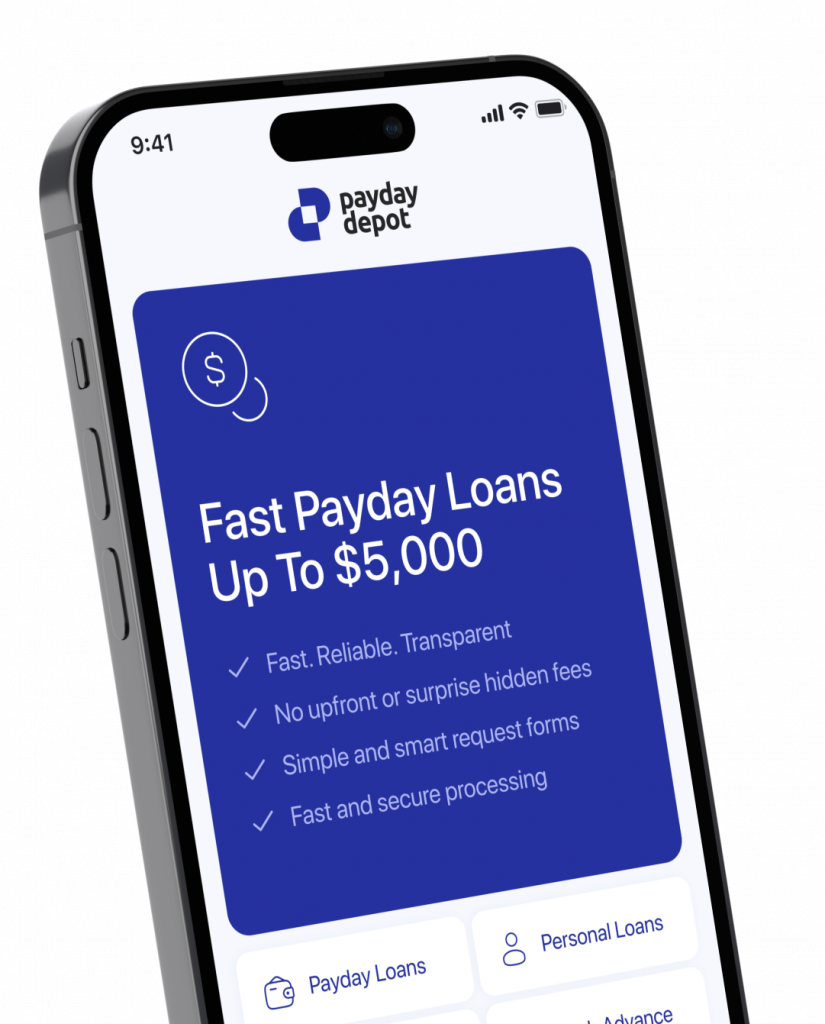Charles Munyi, a financial analyst based in Nairobi, Kenya, possesses a Bachelor’s in electrical engineering and extensive writing and editing training. With over 8 years of experience, he contributes to esteemed platforms like The Balance and Investopedia, covering personal finance, investing, cryptocurrency, and more. Charles writes for business professionals, investors, and finance enthusiasts. Read more
Same Day Loans, Fast Approval Online Payday Loans
Unexpected financial emergencies can crop up at any time. Think about that sudden medical bill, an urgent utility bill expense, or an unexpected crash repair that could set you back several hundred dollars.
If you need to quickly cover an emergency expense, a same-day loan could provide a temporary solution. Same-day loans provide quick and easy cash at high interest rates to people who need money quickly.
In this guide, we will explore same-day loans, how they work, and any alternative financing options you would consider.
What Are Same-Day Loans?
As the name suggests, same-day loans are short-term unsecured loans that typically are paid out to you on the same day you’re approved for the loan.
Also known as emergency loans or quick cash loans, same-day loans are designed to provide immediate cash relief to borrowers facing an unforeseen expense, or who need help bridging a cash shortfall before their next paycheck or other source of income.
Same-day loans come with minimal requirements for the borrower to meet beyond proof of steady income.
But same-day loans can come with hefty interest rates and fees. Same-day loan lenders usually charge a flat fee based on the amount of money you borrow. For instance, a same-day loan could come with an annual percentage rate (APR) ranging from 300% to 1,000%. In comparison, the average APR for a 24-month personal loan is 9.58%.
How Same-Day Loans Work
Same-day loans are typically repaid in a single installment of the principal and all associated fees. In many cases, your required repayment date will fall on the same day you expect your next paycheck or income check — usually a period of two weeks, though it could be shorter for borrowers who are paid on a weekly basis, or longer for borrowers who receive their income monthly.
Many same-day lenders will express the cost of your loan as a dollar fee for every $100 borrowed. The fees at storefront lenders may range between $10 and $30 per $100 borrowed, though variations will occur due to state laws placing limits on the maximum allowable fees.
Same-day loan contracts require you to pay back your loan and associated fees by the stipulated due date. If you can’t clear the full debt, the lender may allow you to roll over the loan balance until your next payday if you pay an additional fee equal to the original finance charge.
For instance, if your lender charges a rollover fee of $50 for when a $500 loan is first due, you’ll still owe the $500 after the extension, as well as an extra $50 when the loan period lapses. This translates to $100 for borrowing $500 for a month.
What Kinds of Same-Day Loans Are Available?
Here is an overview of several different same-day loan options you can consider:
Payday Loans
A payday loan is a type of small, short-term personal loan that is meant to bridge a financial gap until your next paycheck. While lenders won’t typically consider your credit score or inherent ability to repay the loan, they may request a blank check or bank account details at the time of application. This means that you can easily be approved for a payday loan even if you have less-than-stellar credit.
With payday loans, you borrow a relatively small amount of money, usually not more than $500. The loan principal and any associated fees are usually due a short time later, typically within one month unless you choose to extend the loan.
Although payday loans boast the flexibility of approval with minimal credit scrutiny, this luxury comes to borrowers at a high price, since same-day loan interest rates are very high. Lenders typically charge a percentage fee or flat fee for every $100 borrowed. The typical fee for a two-week loan sits at $15 for every $100, which translates to an APR of 400%.
Title Loans
Title loans are a form of same-day loans where your vehicle serves as collateral to back your loan. A lender takes custody of your car title in exchange for you to borrow a certain amount of money. You are still able to drive your car as you repay the loan, but a lender may repossess your car if you default on the payment.
Similar to payday loans, title loans do not require any credit pulls, and money may be disbursed into your bank account on the same day. However, a lender may charge different processing fees, with typical financing fees ranging from 25% per month, which translates to a 300% APR. You’re also at a higher risk of losing your car if you fail to honor the loan due date.
Pawnshop Loans
A pawnshop loan is another type of small-dollar loan that could put cash in your hand on the same day you apply. Pawnshop loans let you use valuables like jewelry, heirlooms, or electronics to act as collateral for an agreed-upon sum of cash. The cash amount is often less than what the valuables are actually worth.
The pawnshop then holds onto your valuables until you pay back the loan, after which you can collect your valuables. If you don’t repay the loan, the pawnshop may sell the items in order to recoup its losses.
Credit Card Cash Advances
If you’re short of cash or can’t settle a bill with your credit card, taking out a cash advance from your credit card can help you get money on the same day you apply. You may use the cash advance feature to draw cash at a local bank or credit union.
Unlike other forms of same-day loans, credit card cash advances usually charge an upfront fee, usually 5% of the money you’re looking to take out. As you may expect, interest rates on cash advances are higher than the standard credit card interest rate.
What Documents Do I Need To Get a Same-Day Loan?
When obtaining a same-day loan at a storefront location, you will first need to meet a string of eligibility requirements. For starters, a lender will generally require you to present some form of identification, provide proof of income, and have an active personal deposit account.
Most lenders will not consider any other financial obligations you carry, or dig into your credit report when determining your eligibility for a loan. However, some lenders may use specialty reporting firms to check whether you carry any previous defaults on payday loans, and perform extra due diligence such as deposit account and identity verification.
While no collateral is held for same-day loans, lenders will require you to either provide a personal check or authorization to electronically debit your deposit account for the total loan amount and associated fees. While the authorization simply acts as a form of security for the loan you’re taking, you will usually agree to go back to the lender’s storefront on the due date to pay the loan in person.
If you fail to make a payment when the loan is due, your lender may proceed to deposit your check or initiate an electronic withdrawal from your deposit account.
Where Can I Get a Same-Day Loan?
Some same-day loan providers are small credit merchants with physical storefronts that allow borrowers to make on-site credit applications and approvals. Other same-day loan services can be found online through online lenders.
Prior to completing a payday loan application, any lender will require you to provide some pay stubs from your employer to act as proof of your current level of income. Lenders will typically base the loan principal on a percentage of your predicted short-term income. You can also consider reaching out to family and friends for financial assistance, or temporarily use your credit card to float emergency expenses in a pinch.
Costs and Fees Associated With Same-Day Loans
Same-day loans typically charge a fixed dollar amount or percentage of every $100 borrowed. Depending on state laws and the maximum your state allows you to borrow, this fee could range between $10 and $30. But the fixed fee is just the tip of the iceberg. Other costs associated with same-day loans include:
- Rollover fees. If you can’t pay off your loan when it’s due and your state laws allow for rollovers, the lender may let you pay the loan fees due and extend your loan to a different maturity date. However, your lender will still charge another fee for the rollover period and you’ll still owe the initial loan balance.
- Late fees. In addition to a rollover fee, your lender may charge a late fee if you don’t repay the loan on time, depending on the laws in your state or territory. Your credit union or bank might also charge a non-sufficient funds fee if your checking account can’t be debited due to insufficient funds.
- Repayment plan fees. In some states, lenders are mandated to provide repayment plans to borrowers who have difficulties paying their loans. Laws around repayment plans vary from state to state and may or may not require a fee to use the service.In some cases, however, the additional time and arrangement to repay your loan may come at a fee. This means that you may end up racking up more fees and falling further into debt.
- Debit card fees. If your lender loads your funds onto a debit card, you could be charged additional fees for adding funds onto the card, checking your balance, or a regular monthly card fee.
Carefully reading through the loan agreement before you sign on the dotted line may help you spot any costs and fees associated with a loan before you take it out.
Advantages of Same-Day Loans
Same-day loans can save the day when you need immediate funds, and there’s more. Besides being able to receive money on the same day, here are other advantages of same-day loans:
- Easy access. Same-day loans are an easy borrowing option since they provide quick cash with great convenience. Unlike traditional loan products that require extensive paperwork and verification, you only need proof of income and identity to qualify for a same-day loan. Just present yourself at a storefront or fill out your application online.
- No credit history required. People with poor credit struggle to take out conventional loan products because banks perceive them as high-risk borrowers. However, the narrative is different with same-day loans.Most same-day loan lenders won’t dig into your credit profile, so you will easily qualify for a quick loan with a poor credit score. A same-day lender will not subject you to stringent affordability checks to assess your previous history and ability to repay debt.
- No collateral needed. Same-day loans are largely unsecured, meaning you don’t need to provide any form of collateral to back up your loan. However, if you’re taking a loan from a pawn shop, you may need to hand in your precious heirlooms as collateral for the money you borrow. The same applies if you’re using your car title to back your loan.
The Risks of Same-Day Loans
Same-day loans are not as friendly as they may sound on paper. While many providers market them as a quick fix to a short-term financial strain, the long-term implications can be dire for borrowers who fail to pay off the loan amount when it is first due:
More Financial Trouble
A borrower who lacks sufficient income to settle their loan may end up in a vicious cycle of endless debt. Many borrowers face the risk of running into financial trouble if they can’t pay back the money they owe when it’s due. Each time you extend the loan, the lender tacks more fees onto your principal.
Most same-day loans are usually due in a fortnight, and are tied to your pay cycle. A lender will have direct access to your checking account on payday so that they can collect their money from your income before you settle other bills.
Consumers with less-than-stellar credit can also access same-day loans since no rigorous credit check is needed. The less rigorous approval process means that a borrower could be approved for a loan they are not in a position to pay off. This could end up leaving them with more debt, and eventually damaging their credit score further.
High Interest Rates
Same-day lenders charge high interest rates on loans, with the average APR running to as high as 400%. Across the U.S., different states have usury laws that are meant to cap interest charges to between 5% and 30%.
However, same-day lenders are exempt from these laws, which allows them to tack high interest charges. Besides, same-day loans are advanced by exploiting various lending loopholes. And while lenders are required to disclose their same-day loan charges, many borrowers inadvertently ignore these costs. Borrowers who can’t pay off the loan on the due date can have it rolled over, and so are the financial charges associated with it.
If you’re considering taking out a same-day loan, start by using a personal loan calculator to determine how much the loan will cost you in fees.
How To Get a Fast Same-Day Loan
Follow these steps to prepare for your loan application and get approved for it on the same day.
- Gather all documentation: As with any type of loan application, your same-day loan lender will need you to provide proof of income and identity, among other information. In fact, many lenders claim that their ability to fast-track your loan application depends on how easily your documentation can be verified. If extra documentation is required, be as responsive as possible.
- Estimate your loan payment: Since same-day loan lenders often have a fixed charge on the amount borrowed, you may be able to predict how much you anticipate to pay by punching in the figures in an online calculator. Use these estimates to assess what steps you can take to pay off your loan on time.
- Compare and pre-qualify: Pre-qualifying for loans helps you determine the amount of money you are eligible to receive based on your profile. While little credit scrutiny goes into being approved for a same-day loan, comparing lenders may help you identify loans attracting the lowest interest rates.
- Apply: While most same-day loan applications are done physically at storefronts, some lenders will let you apply for a loan online, where you’ll typically be approved on the same day that you provide all requisite documentation. Once approved, you can expect the funds to hit your bank account within one business day.
The Bottom Line
Same-day loans are typically available to anyone who has valid identification, can prove their source of income, and holds a checking account. While these loans provide the instant convenience of bridging a financial gap, charges may quickly escalate, which could end up plunging you into more debt. Always be sure to compare lenders, read the loan fine print, and make sure you can pay off the loan on time.



